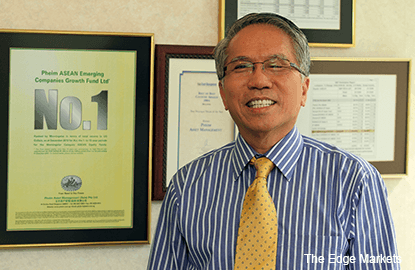
This article first appeared in Personal Wealth, The Edge Malaysia Weekly, on October 19 - 25, 2015.

THE manufacturing sector, particularly semiconductor firms, is poised to outperform the market in the coming months as volatility in the global equity market persists. Dr Tan Chong Koay, founder and chief strategist of Pheim Asset Management Sdn Bhd, one of the oldest boutique fund houses in the country, believes that strong headwinds, such as a weak ringgit and volatile stock market, present an opportunity to buy undervalued stocks.
Semiconductor firms will benefit as these chips are used in consumer products, which still have a massive market, says Tan. “We are cautiously bullish on the manufacturing sector, with a focus on the mobile phone and automotive segments because they are still growing.”
As semiconductor players are export-oriented, they stand to benefit from the weak ringgit as their inputs are sourced and denominated locally, he adds.
In an Aug 18 report, Maybank Investment Bank reiterated its overweight stance on the semiconductor industry. Analysts Ivan Yap and Adrian Wong believe that these players are fairly resilient and will reap the benefits of a weaker local currency as exports are mainly done in the US dollar.
Last month, The Edge reported that despite fears of a slowdown in the global smartphone market and recent correction for semiconductor counters listed on Bursa Malaysia, the stocks managed to maintain year-to-date gains of between 17% and 49%.
On average, the share price of outsourced semiconductor assembly and test (OSAT) companies rose 38%, while automated test equipment (ATE) manufacturers advanced 33%.
Tan says investors could also look into plantation stocks, following the recovery in crude palm oil (CPO) prices as a result of possible lower output due to the El Nino effect. CPO prices rose to RM2,318 per tonne on Oct 7 from a low of RM1,867 on Aug 26.
Tan, who has been a value investor for almost four decades, believes that value investing can be executed with a good chance of success despite the weak performance of the ringgit. The currency has plummeted 24% since January, causing foreign investors to sell off local stocks.
“Although the stock market is uncertain now, investors should take a longer-term view — at least one or two years instead of one or two months — and buy into undervalued but quality companies. Many companies with good management teams will ride out the storm and continue to grow, so buying these stocks at discounted prices would make sense,” he tells Personal Wealth.
The 65-year-old adds that investors should avoid trying to catch the bottom of the market and hope that the price of undervalued companies will fall even further. “When it is low enough, you should buy. There is only one price that is the lowest and only one or a rare few can get the lowest [price].
“In my 39 years of experience, I have only been able to get the lowest a few times. Recently, we bought into Sarawak-based timber concessionaire Jaya Tiasa Holdings Bhd at the lowest price of RM 1.06 per share … we believed that the price was low, but we did not know it was the lowest. It did not appear undervalued, but it would be undervalued if the anticipated palm oil price goes up later.”
Seeing that returns from traditional asset classes are hard to come by, alternative investments, such as hedge funds and private equity, are a good form of diversification for high-net-worth individuals, says Tan. “Private equity can be a good diversification, especially if the management team has a long track record even though the company is a start-up.”
Hike in US interest rates not a bad thing
A degree of calm returned to the global markets when the US Federal Reserve deferred an interest rate hike in September after employment data showed that private sector hiring was lower than anticipated.
But the economic turmoil in China, after its stock markets crashed in June, forced regulators to take drastic measures. These resulted in an effective devaluation of the renminbi and a slowdown in the economy.
Tan says an interest rate hike by the Fed may not be a bad thing as it reflects positively on the strength of the US economy and local trade numbers. “It shows that the economy is recovering … the long and unbroken bull run of the stock market over the past five years is a concern, especially with the Fed’s commitment to raise interest rates soon as it might create some volatility.”
However, foreign events are not the only contributing factors. The issues surrounding 1Malaysia Development Bhd (1MDB) are also part of the psychological factor that is destabilising the currency, says Tan.
“Our economy is still challenging. We are facing some short-term challenges, especially with regards to long-term political stability. We don’t have much to say about this matter, but we must be realistic about it,” he says.
Asked if the current currency crisis, which has seen the ringgit plunge to its weakest level since 1998, is anything like past event, Tan says it is still considered a “normal economical down cycle”.
“China is slowing down, causing supply-demand imbalance. This is impacting the emerging market, especially commodities-producing countries such as Indonesia and Malaysia. As the region — including China, Southeast Asia and Far East Asia — slows down, foreign investors are pulling funds back to the US, causing other currencies to weaken against the greenback,” says Tan.
“Banks are still in healthy shape, compared with the Asian financial crisis in 1997/98 and the global financial crisis in 2008.”
Tan has mastered the small cap market for decades through the use of economic indicators coupled with nimble hands and years of experience. Pheim manages almost RM1 billion in assets today.
Save by subscribing to us for your print and/or digital copy.
P/S: The Edge is also available on Apple's AppStore and Androids' Google Play.